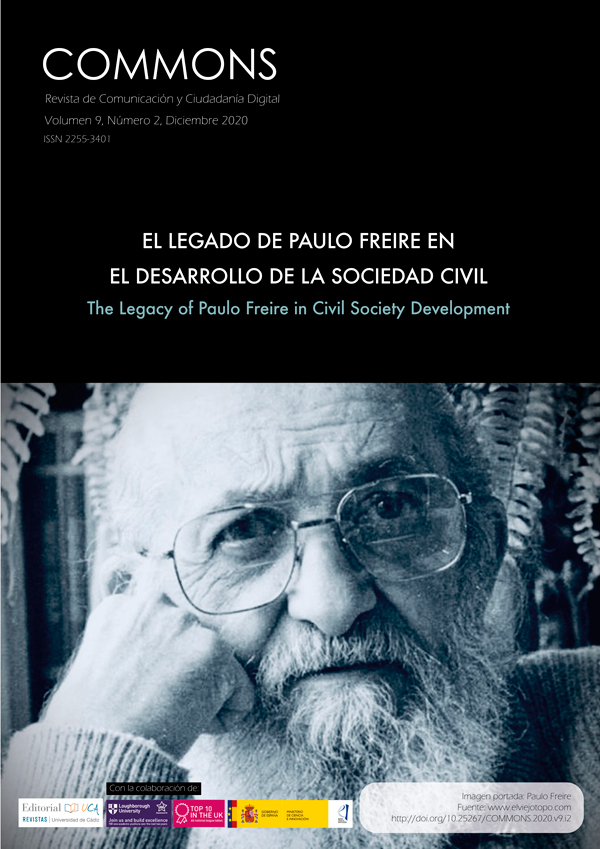Connections with Paulo Freire’s legacy in anti-racism media activist collaboration in Finland / Conexiones con el legado de Paulo Freire en la colaboración mediactivista antirracismo en Finlandia

DOI
https://doi.org/10.25267/COMMONS.2020.v9.i2.04Info
Abstract
In this article, we introduce the Finland-based initiative Anti-Racism Media Activist Alliance (ARMA Alliance, 2018-2020). The article presents our ethical- methodological reflections about the processes of collaboration and dialogue we have experienced as co-founders and coordinators of ARMA Alliance. Our analysis is grounded on our joint retrospective analysis of how the activist-research purposes of ARMA Alliance connect with Paulo Freire’s legacy. Our objective is to contribute to scholarship that problematizes the multi-layered relationship between research and activism in collaborative processes of communication for social change (in our case, against racism). First, we present what the ARMA Alliance initiative means and how it connects with Paulo Freire’s work. Then, we look back at the decolonial insights, cathartic encounters and dialogues that led to the development of the initiative. After that, we reflect about the relationship between collaboration and conscientization. Lastly, we indicate some experiences in putting dialogue and collaboration into practice.
Keywords
Downloads
How to Cite
License
Authors who have published with this journal accept the following terms:
- Authors shall retain their copyright and guarantee the journal the right of first publication of their work, which shall simultaneously be subject to the Creative Commons 3.0 Recognition License, which allows third parties to share the work as long as its author and first publication are indicated in this journal.
- Authors may adopt other non-exclusive licensing agreements for the distribution of the published version of the work (e.g., depositing it in an institutional telematic archive or publishing it in a monographic volume) provided that the initial publication in this journal is indicated.
- Authors are permitted and encouraged to disseminate their work via the Internet (e.g., in institutional telematic archives or on their website) before and during the submission process, which may lead to interesting exchanges and increased citations of the published work. (See The Effect of Open Access).
References
BHAMBRA, G. K. (2014). Connected sociologies. London: Bloomsbury.
CUSICANQUI, S. R. (2012). Ch’ixinakax utxiwa: A Reflection on the Practices and Discourses of Decolonization. South Atlantic Quarterly, 111(1), 95–109. doi: 10.1215/00382876-1472612
CUSTÓDIO, L. (2016). Global overview of community media as peripheral political action (in Portuguese). Revista Mídia e Cotidiano, 10(10), 138-157. doi: https://doi.org/10.22409/ppgmc.v10i10.9799
CUSTÓDIO, L. (2017). Favela media activism: Counterpublics for human rights in Brazil. Lanham: Lexington Books.
DERICKSON, K. & ROUTLEDGE, P. (2015). Resourcing Scholar-Activism: Collaboration, Transformation, and the Production of Knowledge. The Professional Geographer, 67(1), 1–7. doi: 10.1080/00330124.2014.883958
FREIRE, P. (1998). Reprint: Cultural Action for Freedom. Harvard Educational Review, 68(4), 471–521. doi: https://doi.org/10.17763/ haer.68.4.656ku47213445042
FREIRE, P. (2000). Pedagogy of the oppressed (30th anniversary edition). New York: Continuum.
FREIRE, P. (2013a). Pedagogia da esperança: Um reencontro com a pedagogia do oprimido. Rio de Janeiro: Paz e Terra.
FREIRE, P. (2013b). Extensão ou comunicação?. São Paulo: Paz e Terra.
FREIRE, P. & MACEDO, D. (1995). A Dialogue: Culture, Language, and Race. Harvard Educational Review, 65(3), 377–402. doi: https://doi.org/10.17763/ haer.65.3.12g1923330p1xhj8
GANESH, S. & ZOLLER, H. (2012). Dialogue, Activism, and Democratic Social Change. Communication Theory, 22(1), 66–91. doi: 10.1111/j.1468- 2885.2011.01396.x
GATHUO, M. (2019). The inside outsider: The effects and self-reflections of researching one’s own community. In A. KYNSILEHTO, S. PELLANDER & E. PUUMALA (Orgs. Committee). 16th ETMU Conference 2019: Solidarity, participation, and politics. Solidarities in Politically Engaged Research: Ethical and Methodological Challenges and Innovative Practices. Tampere University, Finland.
GUMUCIO DAGRON, A. & TUFTE, T. (Eds). (2006). Communication for Social Change Anthology: Historical and Contemporary Readings. South Orange (N.J.): Communication for Social Change Consortium.
HALE, C. (Ed.). (2008). Engaging contradictions: Theory, politics, and methods of activist scholarship. Berkeley: University of California Press.
KENDI, I. X. (2016). Stamped from the beginning: The definitive history of racist ideas in America. New York: Nation Books.
KENDI, I. X. (2019). How to be an anti-racist. London: Penguin Random House.
KESKINEN, S. P. (2018). The ‘Crisis’ of White Hegemony, Neonationalist Femininities and Antiracist Feminism. Women’s Studies International Forum, 68(May-June), 157-163. doi: https://doi.org/10.1016/j.wsif.2017.11.001
KLANDERMANS, B. & STAGGENBORG, S. (2002). Methods of social movement research. Minneapolis: University of Minnesota Press.
LOFTSDÓTTIR, K. & JENSEN, L. (Eds). (2016). Whiteness and postcolonialism in the Nordic Region: Exceptionalism, migrant others and national identities. Farnham: Ashgate.
MALDONADO-TORRES, N. (2007). On the coloniality of being. Cultural Studies, 21(2-3), 240-270. doi: 10.1080/09502380601162548
MAYO, P. (2008). Liberating praxis: Paulo Freire’s legacy for radical education and politics. Rotterdam: Sense.
MIGNOLO, W. (2011). The darker side of Western modernity: Global futures, decolonial options. Durham: Duke University Press. MIGNOLO, W. & ESCOBAR, A. (2010). Globalization and the decolonial option. London: Routledge.
PICKARD, V. W. & YANG, G. (2017). Media activism in the digital age. London; New York: Routledge.
QUIJANO, A. (2007). Coloniality and modernity/rationality. Cultural Studies, 21(2-3), 168-178. doi: 10.1080/09502380601164353.
SAINI, A. (2019). Superior: The return of race science. London: Harper Collins Publishers.
TITLEY, G. (2019). Racism and the media. London: SAGE Publications.
TUCK, E. & YANG, K. W. (2012). Decolonization is not a metaphor. Decolonization: Indigeneity, Education & Society, 1(1), 01-40.
WANG, D. & SOULE, S. (2012). Social Movement Organizational Collaboration: Networks of Learning and the Diffusion of Protest Tactics, 1960–1995. American Journal of Sociology, 117(6), 1674–1722. doi: 10.1086/664685
YANCY, G. (2017). On race: 34 conversations in a time of crisis. New York: Oxford University Press.






